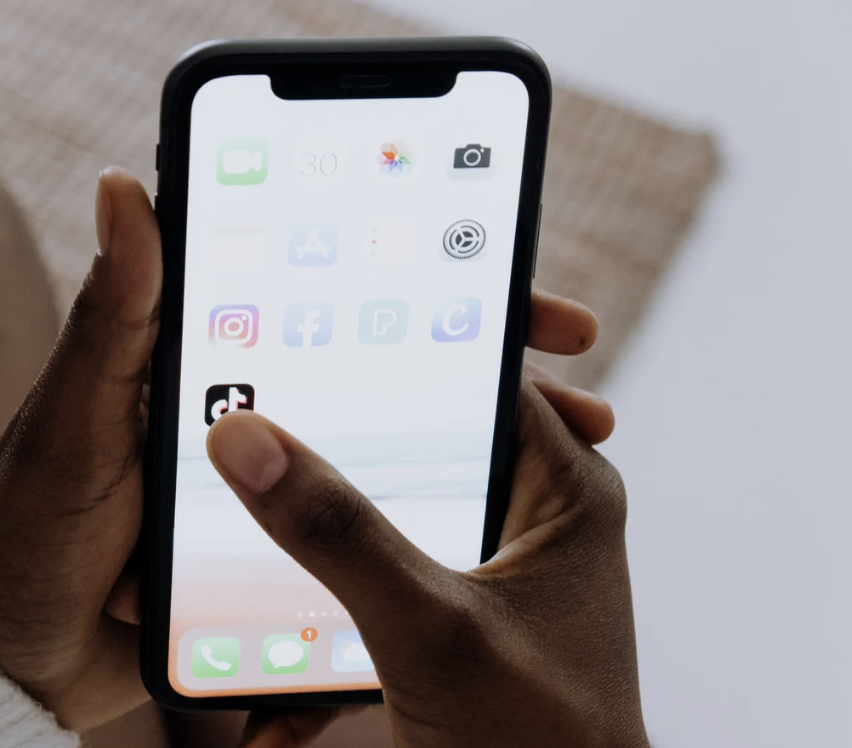On April 25 in Berlin, an adolescent examines a smartphone that has the TikTok brand. Hans-Peter H.
Contrary to popular belief, politics may not be taking over TikTok.
According to new poll results published Wednesday by the Pew Research Center and the John S. and James L. Knight Foundation, the focus on TikTok as a significant political force in the US does not seem to reflect the reality for the majority of users.
Politicians are going to great lengths to court young voters on TikTok, a short-form video app that has amassed 170 million US users. In only a few days after joining TikTok last week, former president Donald Trump had six million followers. The campaign of Vice President Joe Biden began posting videos on TikTok in February and has since produced over 200 of them; but, with just 373,000 followers, it is far behind Trump’s campaign.
However, some lawmakers have voiced concerns that the Chinese government may attempt tremendous political influence in the US if it had access to the personal information of TikTok members, given the firm’s ties to China via its parent company. (Last spring, Biden signed a bill that may prohibit the app from the US. TikTok is seeking to prevent the measure and denies ever giving the Chinese government US user data.)
Pew Research Center’s most recent polls, however, create a picture that shows politics is still relatively minor on the platform. Several TikTok users expressed a strong preference for entertainment, culture, and friends in the study. The poll found that unlike users of Facebook and Instagram, they aren’t particularly interested in or even want political information on their feeds. This is in contrast to X, previously Twitter, where political and news content has always been more prominent.
From March 18th to the 24th, 10,287 adult internet users in the US were polled for Pew’s study. The findings were adjusted “to be representative of all US adults by gender, race, ethnicity, partisan affiliation, education and other categories,” according to Pew researchers.
According to the study, politicians and politically active Americans use TikTok and other social media sites as a new town square to have cultural debates, get political points, and presumably sway the rest of the voters. However, the study presents a somewhat different picture of these sites.
Actually, just 12% of US TikTok users admitted to publishing any political material, and the great majority of those users didn’t even mention politics as a motive for using the app.
“Like on other platforms we’ve studied, on TikTok, politics for most people takes a backseat to things like entertainment and connection,” commentated Colleen McClain, a Pew researcher and co-author of Wednesday’s report.
People that use TikTok aren’t really interested in politics
The poll found that a significant portion of TikTok users, over 40%, do in fact view political information on the app.
Still, among the reasons respondents gave for utilizing the site, politics came in last, suggesting that most users aren’t actively looking for political material, if any exists. While 41% of TikTok users claim to use the app for news, only 33% claim to use it to stay updated on politics.
The data reveal that 95% of users use TikTok for amusement purposes, 62% for product research, and 53% for keeping up with news and pop culture.
Those who refrain from discussing politics on TikTok also have strong opinions about the matter. Among those who do not post about politics, 56% claim to be politically indifferent, and 47% go so far as to say that politics has no place on TikTok.
Political campaigns have a significant hurdle in attracting young voters on TikTok, as seen by these numbers.
Is TikTok more conservative or liberal?
Forty percent of TikTok users are Republicans or lean Republican, according to a September 2023 study by Pew Research Center, while fifty-two percent are Democrats or lean Democratic.
Those figures, along with the ideological leanings of the network’s content and users’ impressions of it, may change if Trump were to join the platform. Last week, a representative from TikTok told CNN that content supporting Trump receives significantly more engagement than content supporting Biden. However, other studies have implied that Biden’s underwhelming performance on TikTok may be linked to his decision to sign a bill that would ban the app, which has angered many TikTok users, including liberals, and his administration’s stance on the war in Gaza, which is unpopular among young voters.
According to the most recent poll by Pew, 22% of TikTok users believe that the app’s content is mostly liberal, while 6% think the opposite. However, it may not provide us with much information: Users of Instagram and Facebook have comparable opinions of the two services, according to Pew. While a small percentage of TikTok users have spoken out against the app’s ideological bias, almost half of all users (48%) either don’t have a strong opinion either way or are unsure.
The fact that 82% of TikTok users believe the app either has no effect on or is largely beneficial for democracy is maybe not surprising, given that US lawmakers are criticizing the app for allegedly endangering US democracy. By a razor-thin margin of 7 percentage points, Republican TikTok users were more inclined than Democratic TikTok users to claim that TikTok is harmful for US democracy.
Radical shifts in opinions on X
These figures stand in stark contrast to the remarkable change in opinion about X that has occurred following Elon Musk’s $44 billion acquisition of Twitter in 2022, which may be a reflection of the divisive manner that Musk has taken to running the platform since then.
Findings from Wednesday’s study show that Republican users’ opinions on Twitter’s impact on democracy shifted from generally negative in 2021 to mostly positive in 2023 and 2024.
Republican users who believe X is largely beneficial to democracy have almost quadrupled in the last three years, and this trend is showing no signs of abating, according to McClain. “This change is rather significant. Furthermore, compared to other platforms, the general trend here is quite different.
Among Republicans who used Twitter in 2021, only 17% said the medium was generally beneficial to democracy. According to Pew, that number reached a peak of 53% in 2023 and had increased to about 50% by 2024. Plus, compared to Democrats, Republicans who post political content on X are far more likely to say that their views are welcome there (54% vs. 33%). Democratic users’ unfavorable perceptions of X have grown and are trending downward within the same time period, according to McClain.
“Views of X and democracy are deeply partisan,” said the Pew assessment. The likelihood that Republicans would claim it’s beneficial for democracy is around double that of Democrats. Compared to Republicans, Democrats are three times as likely to think it’s terrible.
Republican users of X have changed their minds on the platform, but Pew’s study doesn’t comment on why. However, this transformation takes place at the same time as one of the most significant commercial moves the firm has ever made: selling to Musk. Since then, Musk has completely transformed a platform that was previously considered pivotal to politics and news via layoffs, policy changes, and more.
Musk has said that he has restored suspended users who promoted hate speech or otherwise violated Twitter’s rules of service while he has owned the company, and he has also supposedly undone restrictions of conservative speech. Civil rights organizations and marketers reacted negatively because he believed in antisemitic conspiracy theories, removed safeguards for people from underrepresented groups, and emphasized false election claims. In addition, his modifications to the platform’s verification badges made it harder for users to tell the difference between genuine celebrity or brand accounts and those that paid for the appearance of authenticity, leading to an initial surge of high-profile account impersonations.
In contrast to X, the general consensus among Facebook, Instagram, and TikTok users is that these platforms do not affect democracy at all, according to McClain.
Political campaigns will likely continue to use every available medium to contact voters, but this serves as a warning that just because you post something on social media doesn’t mean anybody will really listen.



